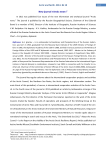Статьи журнала - Arctic and North
Все статьи: 972
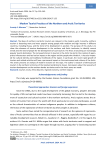
Modern Tourist Practices of the Northern and Arctic Territories
Статья научная
The ideas of northern and Arctic tourism are relevant in the modern world. Currently, northern tourism is becoming more and more popular among people with medium and high incomes in different countries, including Russia, and the trend of its development is positive. The purpose of this study is to show the relevance of tourism development in the northern and Arctic territories, to identify current trends and the need of people for the development of such tourism. The Arctic is becoming an increasingly popular tourist destination. The increased interest in tourism in the Arctic has led to the creation of appropriate infrastructure and has had an impact on the region and the people who inhabit it. It has also impacted the cultural identity and traditional livelihoods of the region. In particular, the recent rapid growth of tourism and related activities will have a permanent impact on the environment and cultures of the Arctic. The article presents an analysis of modern research on this topic. The author’s research of ethnocultural tourism in the northern territories of the Karelian borderland is shown. Conclusions about the necessity of tourism development on the northern border territories and in the Arctic zones are made.
Бесплатно

Modern political image of Russia in Norway (on media coverage)
Статья научная
On the basis of a content analysis of articles published in printed periodicals of Norway during 2008—2014, the current political image of Russia reveals in the article. The analysis of the most talked aspects of political image has been done, a set of causes and factors influencing the perception of the image of Russia in Norway reveals.
Бесплатно
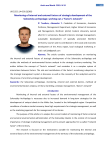
Статья научная
The article contains recommendations on monitoring the internal and external factors of strategic development of the Solovetsky archipelago and studies the methods of environmental factors analysis in the strategic territory marketing. The author defines the concept of “factor’s network” and considers it as a complex system of interactions between factors. The role and contribution of the factor’s monitoring subsystem in the strategic management system is discusses as well as the necessity of the analytical work for the process of a territory strategic development.
Бесплатно
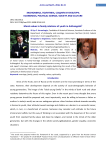
Moral values in family relations of youth in Arkhangelsk
Статья научная
The article presents the results of a sociological survey conducted in December 2014 — May 2015 in Arkhangelsk. The aim of the study was to make an image of the perfect marriage and analysis of the role of moral values in family-marriage attitudes of contemporary youth in the Arkhangelsk. By using such methods as questionnaire survey, document analysis and expert interviews, data were obtained, largely duplicating the result of the survey conducted by FOM and important in predicting the change of the role of spirituality in family values of youth.
Бесплатно
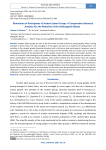
Статья научная
Student labor groups are one of the few forms of social activity of young people, which, having emerged in Soviet times, not only managed to revive again, but also has a tendency of steady growth. The activities of the student groups attracted attention both in historical and social aspects. However, most of the authors addressed only a certain stage in the history of the SCB-RSG and very rarely tried to conduct a comparative analysis of the development of the student movement in the Soviet and modern periods. The works of historians and sociologists and published studies reflect different ideas about the motives of students’ participation in the third labor semester. Some authors believe that the motives have not changed, while others think that they are completely different for modern students. The results of the conducted research, based on interviews, questionnaires, and analysis of the memories of veterans of the movement, show that the motives of the participants have changed slightly, since they depend primarily on the psychological characteristics of youth as a social group. At the same time, the peculiarities of society and state development in different historical periods put an imprint on the priorities and life values of youth, which is reflected in the motivation for participation in the student labor groups.
Бесплатно
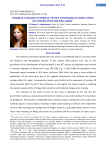
Статья
The article represents the study of the meanings and functions of family items when moving to a new place among the residents of the Kola North. The change of residence is always connected with the interruption of established lifestyle and placement of items. It revealed that while moving, the items environment of the family was reorganized and transformed completely or partially. It means the accelerated change of meaning and status of the moved family items.
Бесплатно
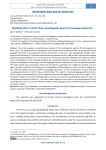
Multilingualism in Arctic Cities: Sociolinguistic Aspects of Language Interaction
Статья научная
The article provides a comprehensive analysis of the sociolinguistic aspects of multilingualism in Arctic cities. The research aims to systematize and critically examine existing studies on the peculiarities of language interaction in the context of intensive urbanization in the Arctic. The methodology includes a qualitative content analysis of 74 Russian and international publications from 1980 to 2024, selected from leading scientific literature databases. As a result, key areas of research have been identified: the impact of urbanization and migration on the language situation, the relationship between language and identity, the visual presence of languages in urban space, and the language initiatives and practices of various population groups. The study reveals that urbanization poses risks of linguistic assimilation for indigenous peoples, but also opens up opportunities for revitalizing minority languages and developing new forms of cultural expression. The common patterns and local specifics of language interaction, as well as the factors of preserving and losing linguistic diversity in Arctic cities, are determined. The need for a balanced language policy and planning to support multilingualism as a key component of sustainable development in the Arctic region is substantiated. Prospects for further interdisciplinary research are outlined, considering the dynamic nature of sociolinguistic processes in the Arctic. The results make a significant contribution to the development of Arctic sociolinguistics and can be used to develop evidence-based language policies and planning measures in the circumpolar region.
Бесплатно
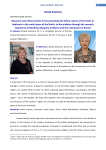
Статья научная
A major part of the museum as a center of preservation of ethnic cultures of the peoples of Russia belongs in ethno tourism. During the expeditions to the Permskiy region, Vladimir and Moscow regions, we studied them in order to collect materials about Mordovians. According to the 2002 census, the number of Mordovians in the Arkhangelsk region was 944 persons in the Murmansk region – was 2 479 people. We hope that together with ethnographers' educational institutions and museums of the northern region, we can begin to study the Mordovian diaspora in the social space of the Arctic and North.
Бесплатно
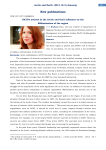
NATO's actions in the Arctic and their influence on the militarization of the region
Статья научная
This article describes the major years of militarization of the Arctic region at present and NATO's role in this process. In conclusion, we can say about a low probability of military confrontation in the Arctic.
Бесплатно

National Arctic Transport Line: problems and prospects
Статья научная
The article represents a rationale for the project of the National Arctic Transport Line Murmansk — Petropavlovsk-Kamchatsky and its problems and prospects.
Бесплатно
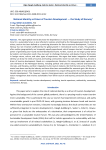
National identity as driver of tourism development - the study of Norway
Статья научная
The urgent global need to decrease the dependence on natural resource extraction and find solutions for a sustainable future is also reflected in policies prioritized by the Norwegian government. Among others, tourism has been defined as a promising alternative for future economic development. Tourism in Norway has not remained unaffected by the global growth in international tourist arrivals. This growth is often neither geographically nor temporally equally apportioned, which hampers tourism’s transformative power of generating year-round and well-distributed income. Further, tourists are no longer purely driven by hedonic and relaxation needs: they also want to challenge themselves and deeply immerse themselves in foreign nature, culture, and other types of experiences. We argue that better integration of national identity can draw the needs of tourists and hosting communities nearer to each other and, thus, become a driver of tourism development. Based on a comprehensive literature, this conceptual paper explores the core elements of the Norwegian identity, including political and cultural values, national characteristics, interests, and lifestyles, and their integration by the tourism industry. We find that only some of these elements have been used by the industry and have often been commodified for economic gain. We discuss a few examples of how national identity can be translated into unique selling points that could generate sustainable development. This, however, requires strong governance, and coordinated and integrative destination management that involves stakeholders from within tourism and beyond, particularly local communities.
Бесплатно
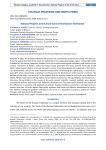
National projects in the Arctic zone of the Russian Federation
Статья научная
In 2021, the Russian Federation will assume the chairmanship of the Arctic Council. This fact confirms the special attention of the country’s leadership to the unique geostrategic region. In December 2020, President of the Russian Federation Vladimir Putin, at an online meeting with volunteers and finalists of the contest “Volunteer of Russia”, noted that Russia would grow with the Arctic and the territories of the North. Many Russian citizens’ lives and the state’s success in the international arena depend on this territory’s development. One of the most important mechanisms for achieving the stated goals is national projects (NP), which should make a significant contribution to the development of the country’s territory. The purpose of the study is to assess NP in the subjects that are entirely related to the Arctic zone: Murmansk region, Nenets Autonomous okrug (NAO), Yamalo-Nenets Autonomous okrug (YANAO), and Chukotka Autonomous okrug (CHAO). In the course of the work, general scientific research methods were applied: comparative analysis, data comparison, induction, deduction, etc. The study results showed that, despite all the differences in economic and geographical position, financial condition, population, and regional development priorities, all Arctic regions have similar problems that hinder the effective development of territories. Without solving the problems indicated in the work, it is impossible to expect a qualitative «breakthrough» and implement the NP’s goals.
Бесплатно
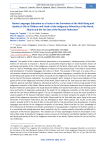
Статья научная
The quality of life is determined by approaches to its assessment, including analysis of the effectiveness of measures to improve it. Russia has accumulated empirical data on socio-economic factors of well-being and quality of life of the indigenous minorities of the North, Siberia and the Far East, however, there is a lack of knowledge about the degree of influence of educational policy in the field of preservation and development of national languages and culture on them. The purpose of the work is to assess the social situation related to the availability of education in the native language as a condition for the formation of well-being and quality of life of children and youth of the indigenous minorities of the North, Siberia and the Far East of the Russian Federation. The study included 2 parts: analysis of macro-level indicators of the quality of life of the indigenous minorities of the North, Siberia and the Far East based on data from ethnic statistics, general statistical indicators, educational statistics; a survey study in which young people of the indigenous minorities of the North, Siberia and the Far East of the Russian Federation from 8 regions of the Russian Federation participated. The study obtained reliable and representative data on the learning conditions and factors of subjective well-being of the youth of the indigenous minorities of the North, Siberia and the Far East living in different regions. The use of comparable indicators to assess the social situation in several subjects of the Russian Federation makes it possible to correctly compare the quality of life of the youth of the indigenous minorities of the North, Siberia and the Far East with their peers living in the same territories of the Russian Federation, but not belonging to these ethnic groups. The results of the study made it possible to fill in the lack of data on the potential for the preservation and development of native languages and cultures of the indigenous minorities of the North, Siberia and the Far East. Knowledge of the mechanisms of formation of attitudes and behavior of young people is important for Russian society, as it is associated with making decisions about potential risks for a special socially vulnerable and difficult-to-study part of the Russian population. The complex use of socio-psychological research and analysis of statistical data made it possible to triangulate various sources of information and identify significant factors of well-being and quality of life of the indigenous minorities of the North, Siberia and the Far East of the Russian Federation.
Бесплатно
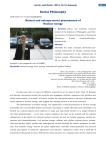
Nature and antroposocial phenomenon of nuclear energy
Статья научная
Identified the main concepts. Performed pioneering researchers for Russia, antropo-social complex components of the phenomenon of nuclear energy. Phenomenon without which, life on Earth is excluded. Researchers have brought to the pragmatic way of SAMPO.
Бесплатно
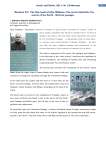
New Book of Glyn Williams “The Arctic Labyrinth: The Quest for the North-west Passage”
Статья
Бесплатно
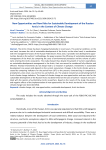
Статья научная
The Arctic climate has been changing dramatically in recent years. This external condition, on the one hand, increases the risk of sustainable development of the Arctic; on the other hand, in combination with the management factors of the Russian Federation’s Arctic zone, it provides new development opportunities. Based on the authors’ methodology, the paper assesses the efficiency of sustainable development management of the Arctic by comparing the costs of environmental protection and the volume of pollutants entering the Arctic ecosystems. The study has shown that, despite the growth of current expenditures on sustainable development management in the Arctic, their use cannot be considered fully effective and efficient: financial investments do not always lead to the reduction in pollution; investments in sustainable development are uneven and depend on the current conjuncture. Changes in the Arctic climate have been assessed by comparing indicators for the period from 1971 to the present, characterizing air temperature, precipitation, snow cover, sea and river ice, permafrost, etc. The analysis has revealed an accelerated growth of Arctic climate change indicators. The impact of climate change on new opportunities and new risks for the sustainable development of the Russian Arctic has been determined on the basis of authors’ research and correlated with the opinion of authoritative Arctic researchers. Based on the results of the study, the positive and negative effects of the implementation of new opportunities for the Arctic territories in the context of climate change have been identified.
Бесплатно
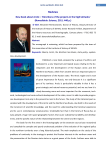
Статья научная
The monograph is reviewing, which has been prepared by the team of the researchers of the Institute of History of SB RAS.
Бесплатно
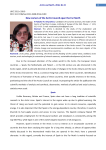
New comers of the Arctic Council open the Far North
Статья научная
The article is devoted to the study of the elaboration and realization of the Arctic policy in three countries-members of the EU. These are Netherlands, Poland and Spain. Up to now Spain is not very interested in the Arctic, but now it is very interested in the development of the arctic tourism. Netherlands possesses the wide experience in offshore extraction of hydrocarbons, which may be used in the Far North. Poland is very active and aims to unite the observer countries of the Arctic council. The study of the climate change and environmental conditions are the main objects of the interests of these three countries.
Бесплатно
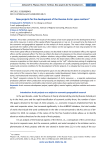
New projects for the development of Russian Arctic: space matters!
Статья научная
The article summarizes the results of the analysis of 23 recent projects for the development of Russian Arctic resources in terms of the spatial effects they generate or rely on. It is proved to be the feature of the economic and geographical approach to the analysis of arctic projects. The most critical change, compared with the realities of the late Soviet era, is the reliance on the sea logistics of most new projects for the development of Russian Arctic resources. Three main spatial effects of development projects are described in detail: the localization effect, the regional effect, and the corporate effect. The first one reflects the desire of companies to the utmost compactness and low occupancy of the production site, platform solutions using artificial intelligence, remote control, robotic mining, and processing schemes. The second effect revives the Soviet district effect within the contour of the resource corporation as their desire to provide cost savings on the “soft” infrastructure pairing of neighboring production facilities. The third effect characterizes the cooperation of usually competing companies in severe natural and economic conditions for the development of arctic projects. It is untypical but may occur in some cases. The territorial structures of the new development space are also affected by the desire of companies to absolute control of the resource chain, to rely on previously created development bases, technological, organizational, and institutional innovations, which usually have a spatial “dimension”. An “ideal” corporate scheme for the modern development of arctic resources - a separate autonomous production platform where production and processing are deployed, with uninhabited technologies and remote control of production, contradicts state interests and creates sharp spatial and social contrasts.
Бесплатно

